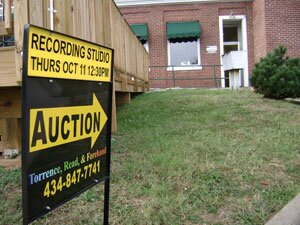NEWS- Sound off: Crystalphonic closes after four years

Among the inventory Crystalphonic will auction is not only recording equipment, but also a grand piano and a 50-inch plasma-screen TV.
PHOTO BY LINDSAY BARNES
Only four years after opening its doors, Charlottesville's multi-million dollar recording facility, Crystalphonic Recording Studio, has declared bankruptcy and will sell off much of its contents at an auction on Thursday, October 11, according to a sign out front and an auction company's classified ad.
Crystalphonic CEO Dave Spence offers no explanation: "I am not at liberty to say anything," he says.
The ignominious unraveling is a far cry from the fanfare that accompanied the enterprise's flashy 2003 opening in the old Monticello Dairy building on Grady Avenue, when it was purported to be on a par with the best studios in the world. One appeal was the atmosphere of small-town Virginia: calmer than the hustle and bustle of New York, Los Angeles, and Nashville.
In a pre-opening interview, Crystalphonic founder Kevin McNoldy said that many a musician with whom he had worked had said of Charlottesville, "Man, if I could live there and work, I would."
However, according to Hackensaw Boys' manager Che Stratos, the atmosphere at Crystalphonic was anything but relaxed.
"Even at the opening party," she says, "everyone was a little too worried. A friend and I were checking out the studio console, and somebody came in and chased everyone out of the studio saying that they needed the room to do an interview. It felt like, 'What is this, Spinal Tap?"
Still, that didn't stop the Hackensaws from recording much of their major label debut, Love What You Do, at Crystalphonic in 2004. Even then, the studio was far from the distraction-free refuge it had aspired to be.
"You had people barking things back and forth between the downstairs where the recording was going on and the upstairs where all the business offices were," Stratos says. "It just seemed like they had put so much money and time and effort into it that they were stressed out of the gate."
Stratos suggests that the if-you-build-it just wasn't enough. "Everyone," she says, "was a little too worried about the studio itself and not worried enough about who they were going to approach to bring in."
In early 2005, there were some big gets including recording sessions by jam rockers O.A.R. and former next-big-thing Blue Merle. But by that fall, the steady stream of rock stars clamoring for an analog recording studio had yet to materialize, and even well-established studios on both coasts were closing their doors as at-home digital technology got cheaper.
In an attempt to stay ahead of the curve, Crystalphonic made the switch from an analog sound board to a much cheaper digital system.
Said founder McNoldy then: "When things get low in the industry, that's when change can really happen, and you should invest in the things you believe in because it can only go up from there."
As he made those comments, McNoldy was sitting in his new home in Florida, from where he intended to work with the studio exclusively via the Internet. "In the same amount of time it would take to send a file upstairs to downstairs," he explained, "I can send a file from here to Virginia."
"My involvement with the studio ended shortly thereafter," McNoldy said Friday, October 5. "I'm afraid I can't offer much help to you."
Jack Gray, Crystalphonic's chief engineer until March when he moved to Atlanta, expressed shock at learning of Crystalphonic's demise. "I was working 90-hour weeks there," says Gray. "It's not like I was sitting around with nothing to do."
One of the last clients Gray worked with was local songwriter and guitarist Peyton Tochterman. While laying down the tracks for his new album, Peyton Tochterman's High Society, in late 2006, Tochterman says, he couldn't have been happier working with Gray. But he adds that the surroundings weren't conducive to creativity.
"There were a lot of little things that told me things were whacked out there," he says. "One day I came in for a session, and just before I started playing, all the smoke alarms started going off. So there I am, on a ladder, changing all the batteries in all the smoke alarms by myself. I'm not pretentious, I'll do that work, but you would think they would have somebody there to do that kind of thing if they're putting this kind of money into it."
Still, it didn't take a faulty smoke detector for Toctherman to be alarmed about the studio's future.
"It didn't seem like there was anything really happening there," he says. "I couldn't figure out how they were keeping the doors open."

The Hook covered Crystalphonic's switch from analog to digital in 2005. At the time, it appeared the move might allow the studio to survive the wave of closings that had wiped out studios in New York and Los Angeles.
HOOK COVER
#